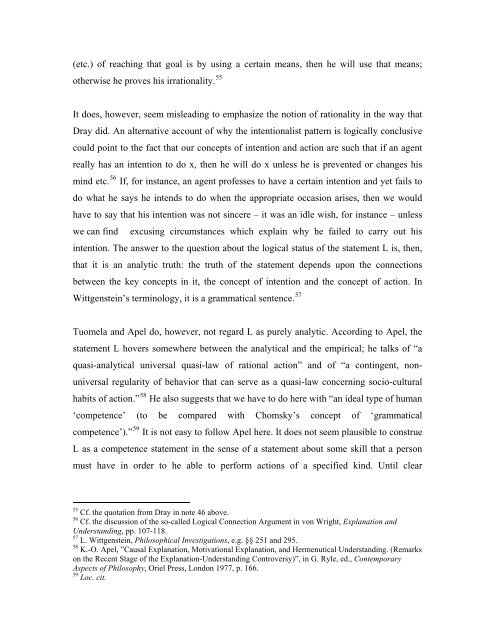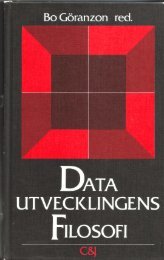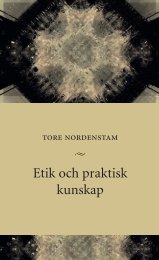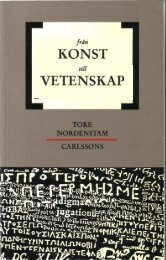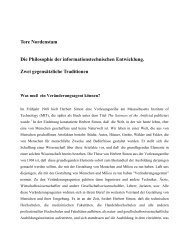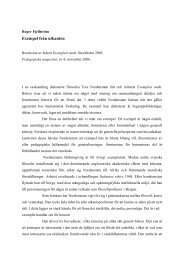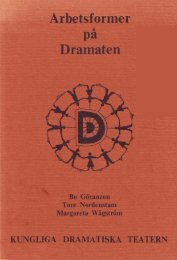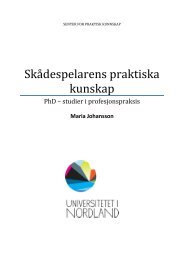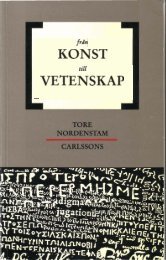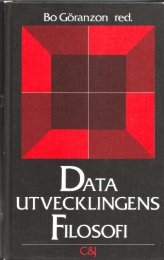tore nordenstam explanation and understanding in the history of art
tore nordenstam explanation and understanding in the history of art
tore nordenstam explanation and understanding in the history of art
You also want an ePaper? Increase the reach of your titles
YUMPU automatically turns print PDFs into web optimized ePapers that Google loves.
(etc.) <strong>of</strong> reach<strong>in</strong>g that goal is by us<strong>in</strong>g a certa<strong>in</strong> means, <strong>the</strong>n he will use that means;<br />
o<strong>the</strong>rwise he proves his irrationality. 55<br />
It does, however, seem mislead<strong>in</strong>g to emphasize <strong>the</strong> notion <strong>of</strong> rationality <strong>in</strong> <strong>the</strong> way that<br />
Dray did. An alternative account <strong>of</strong> why <strong>the</strong> <strong>in</strong>tentionalist pattern is logically conclusive<br />
could po<strong>in</strong>t to <strong>the</strong> fact that our concepts <strong>of</strong> <strong>in</strong>tention <strong>and</strong> action are such that if an agent<br />
really has an <strong>in</strong>tention to do x, <strong>the</strong>n he will do x unless he is prevented or changes his<br />
m<strong>in</strong>d etc. 56 If, for <strong>in</strong>stance, an agent pr<strong>of</strong>esses to have a certa<strong>in</strong> <strong>in</strong>tention <strong>and</strong> yet fails to<br />
do what he says he <strong>in</strong>tends to do when <strong>the</strong> appropriate occasion arises, <strong>the</strong>n we would<br />
have to say that his <strong>in</strong>tention was not s<strong>in</strong>cere – it was an idle wish, for <strong>in</strong>stance – unless<br />
we can f<strong>in</strong>d excus<strong>in</strong>g circumstances which expla<strong>in</strong> why he failed to carry out his<br />
<strong>in</strong>tention. The answer to <strong>the</strong> question about <strong>the</strong> logical status <strong>of</strong> <strong>the</strong> statement L is, <strong>the</strong>n,<br />
that it is an analytic truth: <strong>the</strong> truth <strong>of</strong> <strong>the</strong> statement depends upon <strong>the</strong> connections<br />
between <strong>the</strong> key concepts <strong>in</strong> it, <strong>the</strong> concept <strong>of</strong> <strong>in</strong>tention <strong>and</strong> <strong>the</strong> concept <strong>of</strong> action. In<br />
Wittgenste<strong>in</strong>’s term<strong>in</strong>ology, it is a grammatical sentence. 57<br />
Tuomela <strong>and</strong> Apel do, however, not regard L as purely analytic. Accord<strong>in</strong>g to Apel, <strong>the</strong><br />
statement L hovers somewhere between <strong>the</strong> analytical <strong>and</strong> <strong>the</strong> empirical; he talks <strong>of</strong> “a<br />
quasi-analytical universal quasi-law <strong>of</strong> rational action” <strong>and</strong> <strong>of</strong> “a cont<strong>in</strong>gent, nonuniversal<br />
regularity <strong>of</strong> behavior that can serve as a quasi-law concern<strong>in</strong>g socio-cultural<br />
habits <strong>of</strong> action.” 58 He also suggests that we have to do here with “an ideal type <strong>of</strong> human<br />
‘competence’ (to be compared with Chomsky’s concept <strong>of</strong> ‘grammatical<br />
competence’).” 59 It is not easy to follow Apel here. It does not seem plausible to construe<br />
L as a competence statement <strong>in</strong> <strong>the</strong> sense <strong>of</strong> a statement about some skill that a person<br />
must have <strong>in</strong> order to he able to perform actions <strong>of</strong> a specified k<strong>in</strong>d. Until clear<br />
55<br />
Cf. <strong>the</strong> quotation from Dray <strong>in</strong> note 46 above.<br />
56<br />
Cf. <strong>the</strong> discussion <strong>of</strong> <strong>the</strong> so-called Logical Connection Argument <strong>in</strong> von Wright, Explanation <strong>and</strong><br />
Underst<strong>and</strong><strong>in</strong>g, pp. 107-118.<br />
57<br />
L. Wittgenste<strong>in</strong>, Philosophical Investigations, e.g. §§ 251 <strong>and</strong> 295.<br />
58<br />
K.-O. Apel, ”Causal Explanation, Motivational Explanation, <strong>and</strong> Hermenutical Underst<strong>and</strong><strong>in</strong>g. (Remarks<br />
on <strong>the</strong> Recent Stage <strong>of</strong> <strong>the</strong> Explanation-Underst<strong>and</strong><strong>in</strong>g Controversy)”, <strong>in</strong> G. Ryle, ed., Contemporary<br />
Aspects <strong>of</strong> Philosophy, Oriel Press, London 1977, p. 166.<br />
59<br />
Loc. cit.


